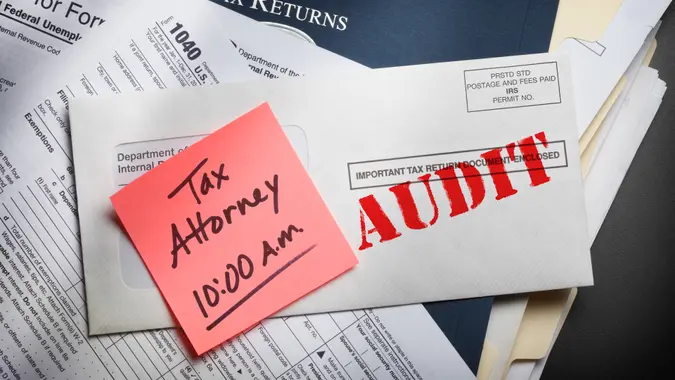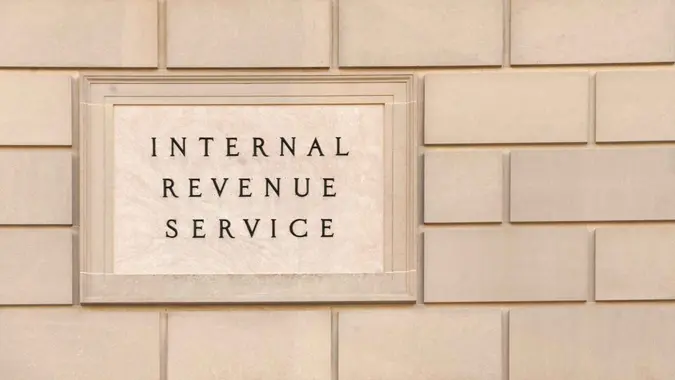How To Write Off Donations

Commitment to Our Readers
GOBankingRates' editorial team is committed to bringing you unbiased reviews and information. We use data-driven methodologies to evaluate financial products and services - our reviews and ratings are not influenced by advertisers. You can read more about our editorial guidelines and our products and services review methodology.

20 Years
Helping You Live Richer

Reviewed
by Experts

Trusted by
Millions of Readers
Tax-deductible donations include money or goods you contribute to tax-exempt organizations, and your charitable giving can benefit you, too, if you take a charitable contribution deduction. By claiming charitable donations as tax deductions on your tax return on Form 1040, Schedule A, Itemized Deductions, instead of claiming the standard deduction, you even could lower your taxable income.
The question is whether you have enough charitable donations, and other qualifying write-offs, to itemize your deductions. The IRS website has a tool to help you calculate your standard deduction. Use either the standard deduction amount or the total itemized deductions, whichever results in the lower amount of tax you’d owe. The greater the deduction, you’ll pay less tax.
What Is the Standard Deduction?
To itemize your deductions – and get proper credit for your donations – the total of your deductions must exceed the standard deduction. For the 2021 tax year, the standard deduction is:
- $25,100 for married couples filing jointly, up $300 from 2020
- $12,550 for single taxpayers and married individuals filing separately, up $150 from 2020
- $18,800 for heads of households, up $150 from 2020
Taxpayers who are blind or at least 65 are eligible to claim an additional $1,350 standard deduction in 2021, or $1,700 if filing as single or head of household. The deduction is doubled for taxpayers who qualify as both.
For the 2022 tax year, the standard deduction will be
- $25,900 for married couples filing jointly, up $800 from 2021
- $12,950 for single taxpayers and married individuals filing separately, up $400 from 2021
- $19,400 for heads of households, up $600 from 2021
Are There Charitable Deduction Limitations?
The Taxpayer Certainty and Disaster Tax Relief Act of 2020, enacted in December 2020, altered tax rules for charitable giving and extended them through 2021. If you haven’t filed your 2021 taxes yet, this law will impact you.
Tax Rules for Charitable Deductions
- The 90% of taxpayers who claim the standard deduction typically cannot deduct charitable contributions from their taxes. Under this short-term 2020 law change, taxpayers can take a deduction of up to $300 for cash contributions — $600 per married couple – made in 2021. Cash contributions to most charitable organizations qualify, according to the IRS, but some groups are exempt. Contributions must be made in cash or check.
- Taxpayers who itemize generally may deduct amounts from 20% to 60% of their adjusted gross income, and the amount varies by the type of charitable organization and type of contribution, the IRS says. For the 2021 tax year, cash contributions made to qualifying charitable organizations are deductible up to 100% of their AGI.
Qualifying Organizations for Charitable Tax Deductions
Donations are eligible for tax write-offs only if you make them to qualified organizations. “An organization has to have received the 501(c)(3) designation from the IRS for it to qualify as a ‘charitable organization’ in terms of deduction donations for tax purposes,” said accountant Eric Nisall, founder of AccountLancer, which provides accounting, tax and consulting services for freelancers. “That means your neighbor’s kid’s Little League team selling raffle tickets isn’t a tax write-off unless the team holds that certification.”
It’s a good idea to check first with the IRS’ Tax Exempt Organizations Search Tool, but generally, charitable gifts to the following types of tax-exempt organizations are tax-deductible donations:
- Churches, synagogues, temples, mosques, and other religious organizations
- Federal, state, and local governments, if your contribution is only for public purposes, such as a gift to reduce the public debt or maintain a public park
- Nonprofit schools and hospitals
- The Salvation Army, American National Red Cross, CARE, Goodwill Industries, United Way, Boy Scouts of America, Girl Scouts of America, Boys & Girls Clubs of America and others
- War veterans’ groups
- A nonprofit volunteer fire company
- Expenses you paid for a student living with you who is sponsored by a qualified organization
- Out-of-pocket expenses for serving as a volunteer for a qualified organization
Non-Qualifying Organizations for Charitable Tax Deductions
Many causes deserve your generous gifts. However, donations to these following types of organizations don’t count as itemized charitable contributions on your tax return:
- Civic leagues, social and sports clubs, labor unions and chambers of commerce
- Foreign organizations, except certain Canadian, Israeli and Mexican charities
- Groups that are run for personal profit
- Groups that lobby for law changes
- Homeowners’ associations
- Individuals
- Political groups or candidates running for public office
- Cost of raffle, bingo or lottery tickets
- Dues, fees, or bills you paid to country clubs, lodges, fraternal orders or similar groups
- Tuition
- Value of your time or services for volunteering
- Value of blood given to a blood bank
“It’s worth noting that donations to political action committees and groups designated as 501(c)(4) nonprofit organizations are not tax-deductible,” said Kay Bell, author and tax journalist for the blog Don’t Mess With Taxes.
How To Deduct Cash Donations
One common error taxpayers make is claiming the full amount of a donation to a charitable organization from which they receive a tangible benefit.
“Let’s say you went to a silent auction and won a prize that was valued at $1,000, but your winning bid — and therefore your donation — was only $500. You can’t claim a tax deduction because you came out ahead $500,” Nisall said.
“But if you went to a charity dinner and paid $1,000 per plate and the meal was valued at only $500, you get to deduct the difference because you actually paid more than the value you received in exchange for your ‘gift,'” he said.
Bell said you’ll need to keep receipts — especially for large donations.
“If you’re more generous, however, you’ll need to be sure you get an official acknowledgment document from the charity,” she said. “In fact, you need to get receipts from all nonprofits to which you give. You don’t have to send them with your taxes, but if you don’t have documentation and the IRS questions your charitable deduction, it can automatically deny it.”
Keep Your Records for Tax Write-Offs
Come tax time, you’ll need to be able to prove your contributions to be able to write them off. It’s critical to keep each receipt proving you made charitable donations for tax deductions.
For charitable contributions of $250 or more, you’ll need a written acknowledgment from a receiving organization confirming the donation — either the cash amount or the description of non-cash contributions, according to the IRS.
Reporting Noncash Charitable Deductions
Individuals must file IRS Form 8283 to report noncash charitable contributions if deductions for all noncash gifts are greater than $500. Things such as art, intellectual property and securities also fall into this category.
Note that for donations that exceed a value of $5,000, an appraisal from a qualified appraisal is required generally.
The record-keeping requirements for non-cash tax-deductible donations depend on the value of the item and are increasingly stringent depending on the value and type of item. “You might want to take pictures of [noncash] items donated so you can substantiate the quality and condition of them,” Nisall said.
“If you don’t have records to satisfy any IRS auditor questions about your donations, you can lose your deduction,” Bell said. “When Congress toughened the donation documentation laws in 2007, it gave the IRS the ability to automatically disallow undocumented donations. Remember, in all IRS transactions, the burden of proof is on you, the taxpayer. So get your receipts just in case you ever need them.”
Jami Farkas contributed to the reporting for this article.
This article has been updated with additional reporting since its original publication. and was last updated on March 13, 2022.
 Written by
Written by  Edited by
Edited by 
























